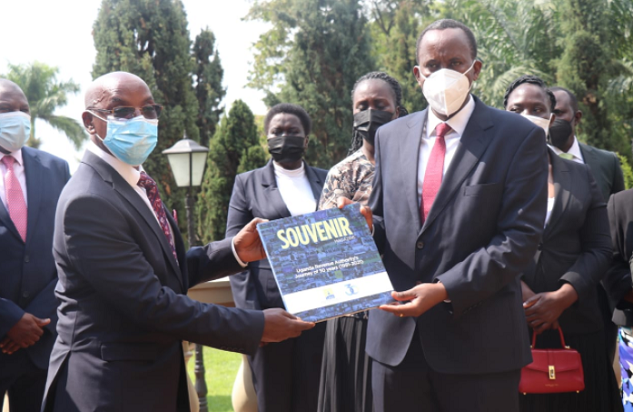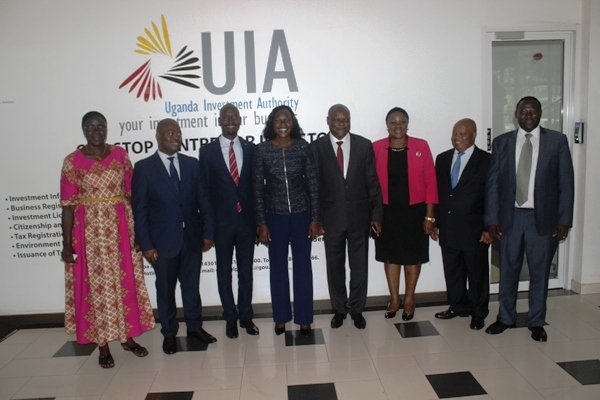The Principal Judge, Flavian Zeija, has asked Judges of the High Court to prioritize cases of revenue collection.
Zeija, was speaking against an earlier remark by Uganda Revenue Authority (URA) Commissioner Legal, Patience Rubagumya, that hundreds of cases worth over Shs 1. 2 trillion are locked up in the courts/Appeal system.
According to Zeija, taxes are a matter of public interest.
“As you consider whether to issue an interim order, you need to consider that we are talking about public interest. The exercise of judicial powers in taxation matters must be exercised with caution, prudence and discretion, taking into consideration the balance of convenience, public interest and the cost of further considerations,” Zeija said while officially opening the 10th Annual Judges Taxation conference for Judges and member of the Tax Appeals Tribunal at Serena Hotel, Kigo on Thursday morning.
To this, he said, “We should prioritize cases of revenue collection in order to release the money that is locked up in our courts.”
Zeija explained that: “Of course prioritizing does not mean that the Judge may rule in favor of URA. But prioritizing simply means that you allocate these cases, hear them quickly so that whether URA is wrong, they should know early but if the taxpayer is also wrong, they know early. So then we can release this amount of money into the public domain. Voluntariness in tax compliance is always a problem. So, in essence, people will come to you not because they think they have a good case. Sometimes they come just to buy time. Either he knows that he has imported goods which he will sell in a month’s time, raise money and maybe clear taxes after an injunction is issued. Sometimes they come with genuine concern.”
He, however, underscored the importance of the training arguing that “the global economy keeps evolving and so is the tax regime.”
“The recent rampant digitalization especially in international trade and investment has created mainly intangible assets and transactions via ICT platforms. This has caused issues and challenges of readiness and ability of the tax regime in many countries including Uganda to cope up with taxation components related to increased reliance on digitized trade and investment. This coupled with the ever evolving amendments in the Ugandan tax laws necessitates that Judicial officers and all other stakeholders keep abreast with changes and developments in the taxation laws and policies. It is imperative that all stakeholders be continuously trained and equipped with information and knowledge of Uganda’s taxation laws, policies, tax administration, practices and new developments in the taxation law both nationally and internationally,” Zeija said.
Therefore, he added, “this training is timely.”
“It creates opportunities for experts to share information, experiences and learning points with stakeholders on the current developments and the challenges in the tax law, policy and administration. I am grateful that judges of the high court have been considered for this training. It is because the skills that judicial officers deploy to resolve tax related conflicts are critical for either providing lasting solutions or escalating conflicts. I commend URA for putting in innovations and making the tax regime more effective in the implementation of EFRIS across the various business spectrum. These initiatives have remodeled tax collection in as far as business can transmit transaction details to the tax collecting body in real time and issue e-receipts and e-invoices, which not only encourage book keeping and real time authentication of business transactions but also in aiding URA in confirming the self-assessment of the details sent by taxpayers,” Zeija noted.
According to Rubagumya, it is very important for URA to move along with other stakeholders to “ensure that information on the changes which are introduced via the budget speech are well known to our stakeholders.”
“We also want to learn from your unique experiences,” she said.
Rubagumya said that Uganda’s tax to GDP ratio is at 13%, below the sub-Saharan average which is between 16 and 18.
She, however, noted that URA plans to grow this to between 21 and 23 % by the Financial Year 2024/2025.
So, she said that after the 2-day conference, “we should be able to hear feedback from you, hear areas that we need to work together on, to improve our collection.”
While addressing the conference, URA Commissioner General, John Musinguzi, said that “We want to rise up to the expectation of our nation and raise enough revenue for national development.”
Over the years, he said “the taxation training has given us the opportunity to engage with the bench with the view of sharing information and getting feedback which informs our decisions on how to improve our service delivery by putting in place policies to increase our revenue collection.”
“We hope that the information shared with you will be of help in administering tax justice in tax related matters. As URA, we learn so much from interacting and sharing information with you. There is a lot for us to share and learn in respect to experience in executing our obligations in our different capacities,” Musinguzi said.
According to Musinguzi, the task ahead requires a concerted effort in inculcating the tax paying culture and mobilizing the necessary revenue for national development.
“We hope his conference will illuminate the opportunities that we can harness Uganda’s economic independence. Let’s use this conference to recognize the hurdles that impede our progress,” Musinguzi noted.
He emphasized that: “We are currently mobilizing only about 50% of our national budget from domestic taxes. Meaning that every year, our nation has the burden to borrow and look for the other 50% to fund our national budget. We have reset ourselves to raise to the new challenge. We are hoping and working to ensure that in the next 3 to 4 years, we should be able to raise enough resources that can cover our national budget. Our neighbors are achieving this. I have just been to Kenya and they are collecting 95% of their national budget. This is possible if our neighbors can do it.”
The conference organized jointly by URA and the Judicial Training Institute is running under the theme: “Developments in tax law, policy and administration; Delivering Uganda to economic independence.”





